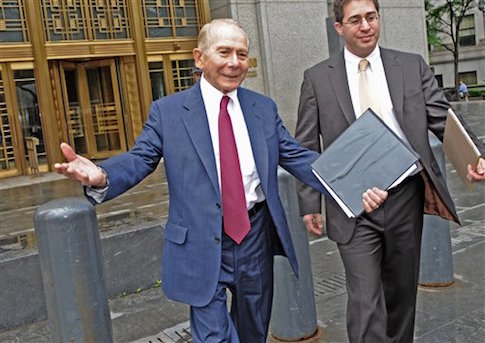Former AIG chief Hank Greenberg agreed to pay a $9 million settlement to New York on Friday, bringing his nearly 12-year legal battle with the state attorney's general office to a far from amicable conclusion.
The case, which was controversially launched by then-attorney general Eliot Spitzer in 2005, initially sought $6 billion in damages from Greenberg, alleging nine counts of financial fraud. By the time Greenberg took the stand last September the state was down to seeking $50 million and alleging just two counts of fraud.
The way that the settlement was announced on Friday illustrates how much bad blood remains between the sides following mediation.
Attorney General Eric Schneiderman treated the $9 million settlement as a victory, blindsiding Greenberg's legal team with a statement claiming that Greenberg "admitted his role" in fraudulent transactions, a claim that Greenberg's lawyer says is false.
"Today's agreement settles the indisputable fact that Mr. Greenberg has denied for twelve years: that Mr. Greenberg orchestrated two transactions that fundamentally misrepresented AIG's finances," said Schneiderman in a statement. "After over a decade of delays, deflections, and denials by Mr. Greenberg, we are pleased that Mr. Greenberg has finally admitted to his role in these fraudulent transactions and will personally pay $9 million to the State of New York."
Greenberg's lawyer immediately called Schneiderman's statement "false and misleading," pointing out that Greenberg's statement in the settlement makes no mention of any transaction being fraudulent.
"The press release issued by the office of the New York Attorney General today concerning their dismissal of their 12-year-old lawsuit against Maurice Greenberg is false and misleading," said lawyer David Boies. "Nowhere in the agreed statement by Mr. Greenberg is there any reference to any accounting being fraudulent, let alone that Mr. Greenberg was aware of any fraud."
Boies said that Schneiderman's case "had totally collapsed at trial," which is why it "agreed to dismiss all of its claims for a new settlement of $9 million." He also pointed out that the mediator failed to grant Schneiderman his other demands in the case, such as a court-ordered ban on Greenberg serving on the board of directors for any public company in the future.
Greenberg also issued a statement after Schneiderman's, making the argument that he has been calling for mediated settlement talks for years but that it was only agreed to after the court trial revealed the "obvious weakness of the attorney general's case."
"I want to reiterate and reaffirm that I did nothing wrong while at AIG," said Greenberg.
Greenberg also used the conclusion of the case to take aim at Spitzer, whom he blames for starting the "unjust crusade" against him as payback for criticizing him in public.
"I intend to continue to pursue my defamation action against Mr. Spitzer, whose political grandstanding started this unjust crusade against me 12 years ago," said Greenberg.
Spitzer's lawsuit forced Greenberg to step down from AIG, a company that had grown into a global insurance giant while Greenberg was at the helm. Greenberg blames Spitzer for its demise, which cost thousands of people their jobs.
"Spitzer threatened AIG with criminal prosecution if I did not leave, leaving me with little choice but to immediately retire," Greenberg said. "And look at the consequences for AIG and the American people."
"AIG is currently a shadow of what it had been. It was an international asset and no longer is. It employed over 100,000 people and now it is about half of that."
Greenberg also took aim at the Martin Act, the New York statute made famous by Spitzer that gives state lawyers the power to make fraud accusations without having to prove any intent to defraud, stating that courts should scrap it.
"New York is the only state in the U.S. that can accuse an individual of fraud without having to prove intent," Greenberg said. "In this respect, the Martin Act simply is not consistent with federal law and it would be desirable to have the courts recognize this."
Greenberg argued that every company doing business in New York is currently under threat of having the Martin Act used against it in the way it was used against AIG.
"It would boost the outlook of companies doing business in New York and those who would like to do business in New York but are fearful of the Martin Act in its current form," Greenberg said.
